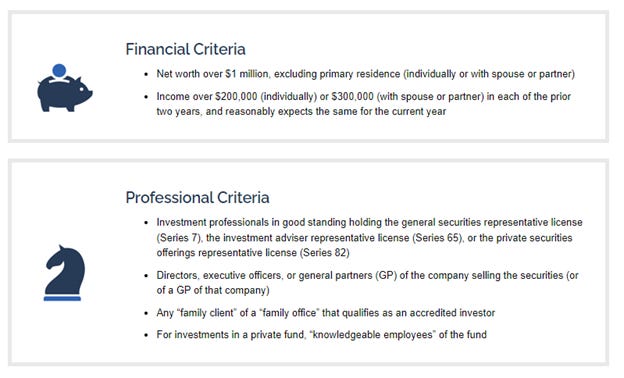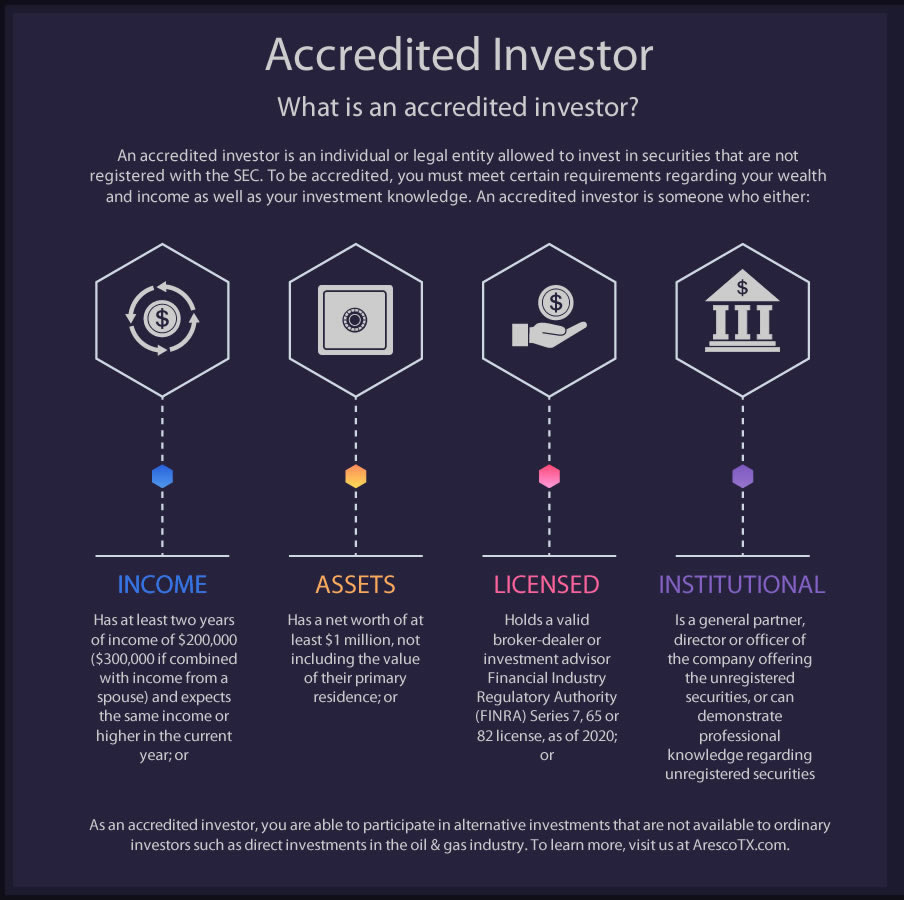All Categories
Featured
Table of Contents
As recognized financiers, people or entities might take part in personal investments that are not signed up with the SEC. These capitalists are presumed to have the economic class and experience required to evaluate and invest in high-risk investment possibilities unattainable to non-accredited retail capitalists. Right here are a couple of to take into consideration. In April 2023, Congressman Mike Flooding introduced H (accredited investor funding opportunities).R
In the meantime, financiers have to abide by the term's existing interpretation. Although there is no official procedure or federal qualification to come to be a certified investor, an individual may self-certify as a recognized capitalist under present laws if they earned greater than $200,000 (or $300,000 with a partner) in each of the previous 2 years and expect the very same for the current year.
People with an energetic Collection 7, 65, or 82 certificate are also taken into consideration to be recognized capitalists. Entities such as companies, partnerships, and trust funds can also achieve certified investor status if their financial investments are valued at over $5 million.
Private Equity (PE) funds have revealed amazing growth in current years, relatively undeterred by macroeconomic difficulties. PE companies swimming pool resources from accredited and institutional capitalists to get managing passions in fully grown private business.
In enhancement to capital, angel capitalists bring their specialist networks, guidance, and know-how to the startups they back, with the assumption of endeavor capital-like returns if business takes off. According to the Facility for Venture Research, the ordinary angel financial investment quantity in 2022 was about $350,000, with financiers getting a typical equity stake of over 9%.
Effective Commercial Real Estate For Accredited Investors Near Me – Honolulu
That stated, the introduction of on-line exclusive credit report systems and niche enrollers has actually made the property class accessible to individual accredited capitalists. Today, capitalists with just $500 to spend can benefit from asset-based private credit score chances, which supply IRRs of as much as 12%. Despite the rise of ecommerce, physical supermarket still make up over 80% of grocery sales in the United States, making themand particularly the realty they operate out oflucrative investments for recognized capitalists.
In contrast, unanchored strip facilities and area facilities, the next two most greatly transacted sorts of property, recorded $2.6 billion and $1.7 billion in transactions, respectively, over the very same period. What are grocery store-anchored? Rural shopping center, outlet shopping malls, and other retail facilities that include a significant grocery shop as the location's main tenant usually drop under this category, although shopping centers with encased pathways do not.
Recognized financiers can spend in these spaces by partnering with actual estate personal equity (REPE) funds. Minimum investments usually begin at $50,000, while total (levered) returns vary from 12% to 18%.
Trusted Passive Income For Accredited Investors Near Me – Honolulu 96801 Hawaii

Over the last decade, art has made typical annual returns of 14%, trouncing the S&P 500's 10.15%. The market for art is also broadening. In 2022, the worldwide art market grew by 3% to $67.8 billion. By the end of the years, this number is anticipated to come close to $100 billion.
Capitalists can now have diversified exclusive art funds or purchase art on a fractional basis. private equity for accredited investors. These alternatives come with financial investment minimums of $10,000 and offer internet annualized returns of over 12%.

Over the past several years, the recognized capitalist definition has actually been criticized on the basis that its single focus on an asset/income test has actually unjustly omitted almost the most affluent people from financially rewarding financial investment possibilities. In action, the SEC started considering ways to broaden this definition. After a substantial comment period, the SEC took on these modifications as a means both to capture people that have reliable, different indications of monetary class and to modernize certain obsolete parts of the interpretation.
The SEC's key issue in its guideline of non listed safeties offerings is the defense of those investors that lack a sufficient level of monetary sophistication. This problem does not relate to knowledgeable staff members since, by the nature of their setting, they have sufficient experience and access to financial information to make educated investment choices.
High-Quality Alternative Investments For Accredited Investors Near Me
The determining aspect is whether a non-executive employee really joins the personal financial investment business's investments, which have to be established on a case-by-case basis. The addition of well-informed employees to the recognized investor interpretation will also enable more employees to buy their employer without the personal investment firm risking its own condition as an accredited investor.
Prior to the changes, some personal investment firms ran the risk of losing their certified investor standing if they enabled their staff members to spend in the firm's offerings. Under the amended meaning, a better number of private investment firm employees will certainly currently be qualified to spend. This not only develops an added resource of resources for the private investment company, yet also additional straightens the interests of the staff member with their company.
Client-Focused Commercial Real Estate For Accredited Investors Near Me
Presently, just people holding certain broker or monetary consultant licenses ("Series 7, Collection 65, and Series 82") qualify under the interpretation, yet the amendments provide the SEC the capacity to include additional accreditations, designations, or qualifications in the future. Certain kinds of entities have actually likewise been contributed to the meaning.
The addition of LLCs is likely the most significant addition. When the definition was last upgraded in 1989, LLCs were fairly unusual and were not consisted of as an eligible entity. Because that time, LLCs have become extremely common, and the definition has actually been updated to show this. Under the modifications, an LLC is taken into consideration a certified investor when (i) it contends the very least $5,000,000 in possessions and (ii) it has actually not been developed exclusively for the particular purpose of acquiring the securities offered.

Particular family members workplaces and their customers have been included to the meaning. A "household office" is an entity that is established by a family to handle its properties and offer its future. To guarantee that these entities are covered by the definition, the changes mention that a household office will now qualify as an approved investor when it (i) takes care of at the very least $5,000,000 in assets, (ii) has actually not been created particularly for the objective of acquiring the offered securities, and (iii) is directed by a person that has the financial refinement to assess the values and threats of the offering.
The SEC requested remarks pertaining to whether the monetary limits for the earnings and possession tests in the definition ought to be changed. These thresholds have actually remained in area because 1982 and have actually not been gotten used to make up inflation or other variables that have altered in the stepping in 38 years. However, the SEC inevitably decided to leave the property and revenue limits unchanged in the meantime.
Latest Posts
How To Buy Tax Sale Property
Investing In Tax Liens And Deeds
Tax Liens And Deeds Investing